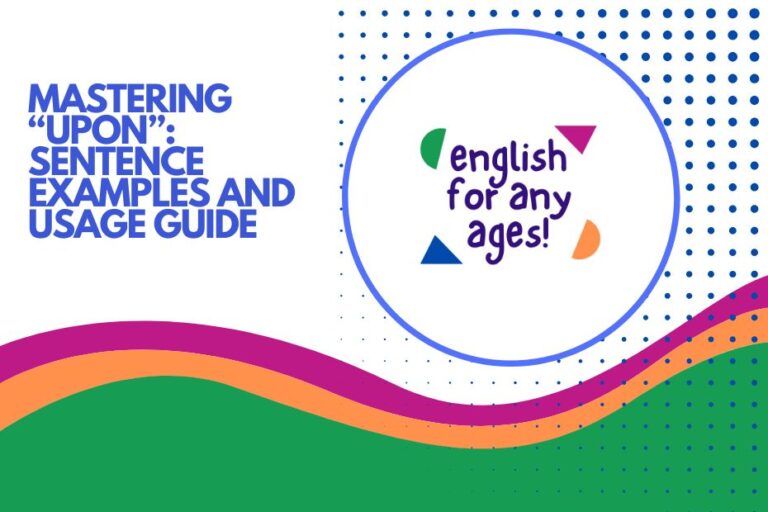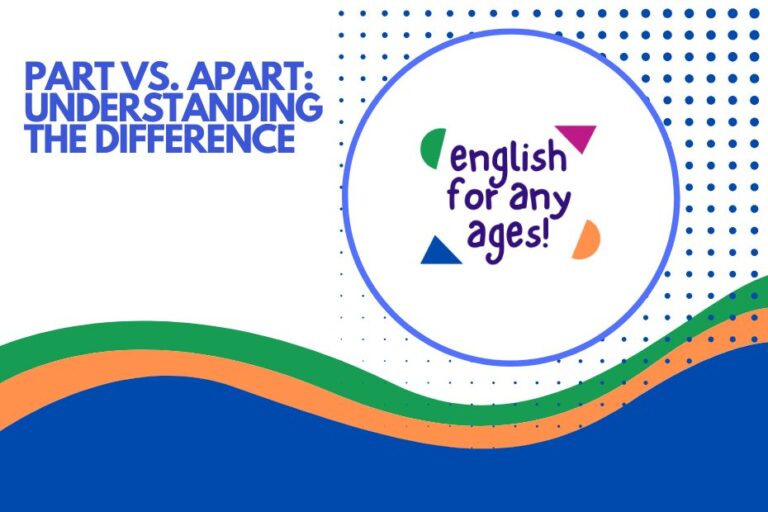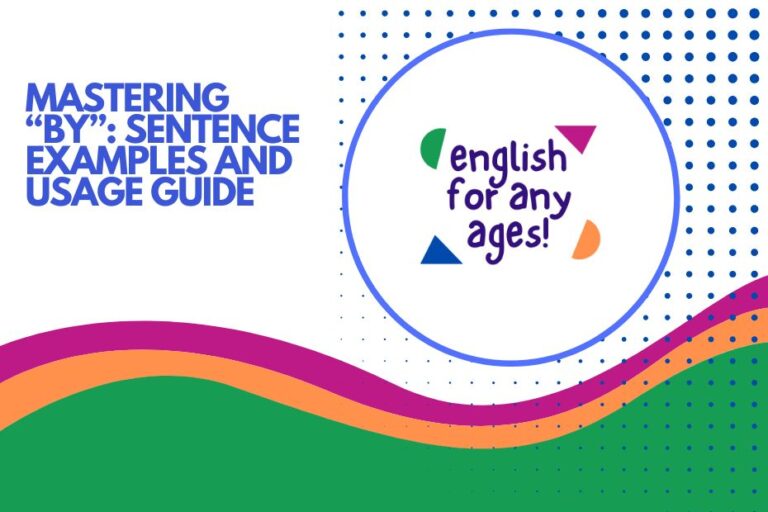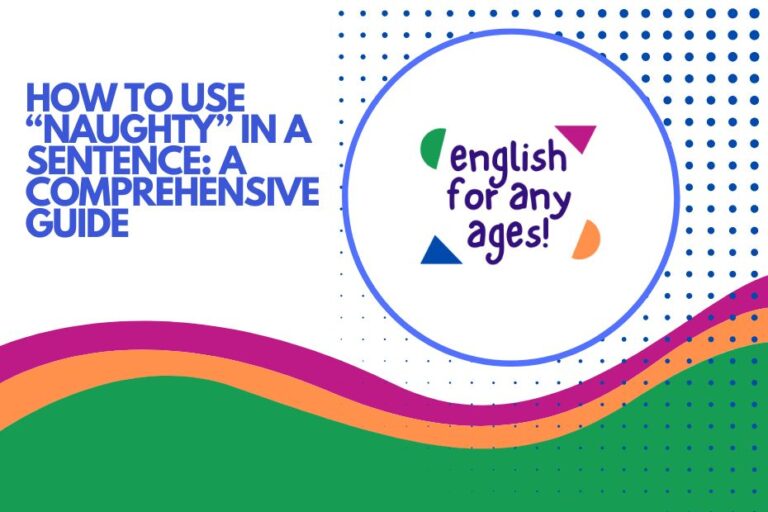Mastering “Off”: Sentence Examples and Usage Guide
The preposition “off” is a versatile word in the English language, used in numerous contexts to express separation, removal, cessation, origin, and more. Understanding its various uses is crucial for both native speakers and English language learners aiming for fluency and accuracy.
This comprehensive guide breaks down the different functions of “off,” providing clear examples, usage rules, and practice exercises to help you master this essential preposition. Whether you’re a student, a teacher, or simply someone looking to improve your English grammar, this article will equip you with the knowledge and skills to use “off” confidently and correctly.
Table of Contents
- Introduction
- Definition of “Off”
- Structural Breakdown
- Types and Categories of “Off” Usage
- Examples of “Off” in Sentences
- Usage Rules for “Off”
- Common Mistakes with “Off”
- Practice Exercises
- Advanced Topics
- Frequently Asked Questions (FAQ)
- Conclusion
Introduction
The English preposition “off” is a small word with a significant impact on sentence meaning. Its versatility allows it to describe relationships of separation, origin, cessation, and more.
Mastering the nuances of “off” is essential for clear and effective communication in English. This article serves as a comprehensive guide, providing detailed explanations, numerous examples, and practical exercises to help you confidently use “off” in various contexts.
By understanding the multiple functions of this preposition, you can improve your overall grasp of English grammar and enhance your ability to express yourself accurately.
Definition of “Off”
“Off” is primarily a preposition, but it can also function as an adverb, adjective, or even a verb in certain contexts. As a preposition, “off” indicates movement away from something, separation, or a state of being disconnected.
It can also denote origin, source, or a deviation from a particular path or course. The specific meaning of “off” depends heavily on the context in which it is used.
Here’s a breakdown of its primary functions as a preposition:
- Separation/Removal: Indicating a detachment or movement away from something.
- Origin/Source: Indicating the starting point or source of something.
- Cessation/Interruption: Indicating the stopping or pausing of an action or state.
- Deviation/Departure: Indicating a turning away or moving away from a course or path.
- Position/Location: Indicating a position away from or not on something.
- State/Condition: Indicating a particular state or condition, often negative or non-functional.
- Distance: Indicating a certain distance away from something.
- Dependence: Indicating lack of dependence on something.
Structural Breakdown
When used as a preposition, “off” typically follows a verb and precedes a noun or pronoun. The basic structure is:
Verb + off + Noun/Pronoun
For example:
- Take off your shoes. (Verb: take, preposition: off, noun: shoes)
- He fell off the ladder. (Verb: fell, preposition: off, noun: ladder)
- She took some time off work. (Verb: took, preposition: off, noun: work)
“Off” can also be part of phrasal verbs, where it combines with a verb to create a new meaning. In these cases, “off” functions more like an adverbial particle.
Verb + off (particle)
For example:
- The alarm went off. (Phrasal verb: went off)
- He showed off his new car. (Phrasal verb: showed off)
- She put off the meeting. (Phrasal verb: put off)
Types and Categories of “Off” Usage
Separation or Removal
In this context, “off” indicates the act of detaching, removing, or separating something from something else. It signifies a physical or metaphorical disconnection.
Origin or Source
“Off” can also denote the starting point or source of something, indicating where something comes from or begins. It often implies a direction or trajectory originating from a specific location.
Cessation or Interruption
Here, “off” signals the stopping or pausing of an action, state, or process. It implies a temporary or permanent end to something that was previously active or ongoing.
Deviation or Departure
This usage of “off” indicates a turning away or moving away from a particular path, course, or topic. It suggests a divergence from a previously intended direction or subject.
Position or Location
“Off” can describe a position that is away from or not on something. This often implies a spatial relationship where one object is detached or separate from another.
State or Condition
In some cases, “off” describes a state or condition, often implying a negative or non-functional state. It suggests that something is not in its normal or operational condition.
Distance
“Off” can indicate a certain distance or separation from a particular point or location. It specifies how far away something is situated.
Dependence
This usage of “off” indicates a lack of reliance or dependence on something. It suggests that someone or something is not connected or reliant on another entity.
Examples of “Off” in Sentences
The following sections provide extensive examples of “off” used in different contexts. Each table contains multiple examples to illustrate the various meanings and applications of this versatile preposition.
Separation or Removal Examples
This table provides examples of sentences using “off” to express separation or removal. Note how “off” indicates a detachment or disconnection between two things.
| # | Sentence |
|---|---|
| 1 | He took his hat off. |
| 2 | She brushed the crumbs off the table. |
| 3 | The cat jumped off the roof. |
| 4 | Take your shoes off before entering the house. |
| 5 | The paint is peeling off the walls. |
| 6 | I wiped the dirt off my boots. |
| 7 | The bird flew off the branch. |
| 8 | He ripped the page off the notebook. |
| 9 | She shook the snow off her coat. |
| 10 | The bandage fell off his arm. |
| 11 | He peeled the sticker off the window. |
| 12 | She chipped the ice off the windshield. |
| 13 | The wind blew the leaves off the trees. |
| 14 | He pulled the tablecloth off the table. |
| 15 | She cut the tag off the new dress. |
| 16 | The button came off my shirt. |
| 17 | I knocked the glass off the shelf. |
| 18 | He lifted the lid off the jar. |
| 19 | She plucked the petals off the flower. |
| 20 | The climber fell off the cliff. |
| 21 | He scraped the mud off his shoes. |
| 22 | She tore the poster off the wall. |
| 23 | The waves washed the sand off the deck. |
| 24 | He brushed the dust off the book. |
| 25 | She peeled the bark off the tree. |
| 26 | The child pulled the toy off the shelf. |
| 27 | He wiped the sweat off his brow. |
| 28 | She peeled the label off the bottle. |
| 29 | The cat leaped off the fence. |
| 30 | He detached the trailer off the car. |
Origin or Source Examples
This table illustrates the use of “off” to indicate the origin or source of something. Notice how “off” shows where something comes from or begins.
| # | Sentence |
|---|---|
| 1 | He bought the car off his neighbor. |
| 2 | She learned the recipe off a cooking show. |
| 3 | I got the information off the internet. |
| 4 | They took the money off the company account. |
| 5 | He copied the answers off her paper. |
| 6 | She borrowed the book off her friend. |
| 7 | I heard the news off the radio. |
| 8 | They received the package off the delivery truck. |
| 9 | He ordered the product off Amazon. |
| 10 | She downloaded the song off iTunes. |
| 11 | He took inspiration off other artists. |
| 12 | She learned the dance off YouTube. |
| 13 | I purchased the course off Udemy. |
| 14 | They received a tip off an anonymous source. |
| 15 | He got the idea off a blog post. |
| 16 | She printed the document off the printer. |
| 17 | I took a sample off the production line. |
| 18 | They received a warning off intelligence. |
| 19 | He copied the code off Stack Overflow. |
| 20 | She drew inspiration off nature. |
| 21 | I bought the furniture off Craigslist. |
| 22 | They heard the rumor off the grapevine. |
| 23 | He purchased the software off the company website. |
| 24 | She got the contact off LinkedIn. |
| 25 | I learned the technique off a master craftsman. |
| 26 | They received the permit off the city council. |
| 27 | He took a loan off the bank. |
| 28 | She got the prescription off the doctor. |
| 29 | I found the article off Google Scholar. |
| 30 | They took a reading off the instrument. |
Cessation or Interruption Examples
This table provides examples of how “off” indicates the stopping or pausing of an action or state. Pay attention to how “off” signals the end or interruption of something.
| # | Sentence |
|---|---|
| 1 | Please turn off the lights. |
| 2 | The alarm went off. |
| 3 | The meeting is off. |
| 4 | She took a week off work. |
| 5 | He switched off the television. |
| 6 | The power went off during the storm. |
| 7 | They called off the wedding. |
| 8 | She put off the decision until later. |
| 9 | The game was called off due to rain. |
| 10 | He signed off the document. |
| 11 | She shut off the engine. |
| 12 | The project was called off. |
| 13 | He logged off his computer. |
| 14 | She took a day off to relax. |
| 15 | The negotiations were called off. |
| 16 | He unplugged the device and turned it off. |
| 17 | She canceled the subscription and turned it off. |
| 18 | The production line was shut off. |
| 19 | He suspended his account and signed off. |
| 20 | She ended the call and hung off. |
| 21 | I’m taking the summer off. |
| 22 | The festival was put off due to the pandemic. |
| 23 | The company laid workers off. |
| 24 | He took time off to care for his family. |
| 25 | She decided to take a break and switch off. |
| 26 | The experiment was put off indefinitely. |
| 27 | He ceased operations and shut off. |
| 28 | She decided to take a sabbatical and step off. |
| 29 | They closed the factory and powered it off. |
| 30 | He temporarily shut off the system. |
Deviation or Departure Examples
This table provides examples of sentences using “off” to indicate a deviation or departure from a path, course, or topic. Notice how “off” suggests a divergence from a previously intended direction.
| # | Sentence |
|---|---|
| 1 | The car swerved off the road. |
| 2 | The hiker strayed off the trail. |
| 3 | He went off on a tangent during the presentation. |
| 4 | The ship sailed off course. |
| 5 | She veered off the planned route. |
| 6 | The conversation drifted off topic. |
| 7 | He took off in the wrong direction. |
| 8 | The ball rolled off the table. |
| 9 | She wandered off into the woods. |
| 10 | The path branched off to the left. |
| 11 | They got off at the wrong exit. |
| 12 | The argument went off on a personal level. |
| 13 | He was led off in handcuffs. |
| 14 | The stream branched off the river. |
| 15 | She was taken off to the hospital. |
| 16 | The car sped off into the distance. |
| 17 | The plane took off on time. |
| 18 | The cyclist sped off ahead. |
| 19 | The runner broke off from the pack. |
| 20 | She walked off in a huff. |
| 21 | The balloon drifted off into the sky. |
| 22 | He went off to war. |
| 23 | The rocket launched and sped off. |
| 24 | The birds flew off to the South. |
| 25 | She traveled off to distant lands. |
| 26 | The arrow shot off towards the target. |
| 27 | He marched off to join the army. |
| 28 | The train pulled off the station. |
| 29 | The boat sailed off to sea. |
| 30 | The astronaut blasted off into space. |
Position or Location Examples
This table illustrates how “off” can describe a position that is away from or not on something. Note how “off” implies a spatial relationship of detachment or separation.
| # | Sentence |
|---|---|
| 1 | The island is just off the coast. |
| 2 | He lives just off Main Street. |
| 3 | The book is off the shelf. |
| 4 | The picture is slightly off center. |
| 5 | Her hat was off her head. |
| 6 | The dog is kept off the furniture. |
| 7 | The town is located off the highway. |
| 8 | The switch is off. |
| 9 | The meeting is off campus. |
| 10 | The store is just off the square. |
| 11 | The house is off the beaten path. |
| 12 | His tie was slightly off. |
| 13 | The painting was hanging off the wall. |
| 14 | The event is held off site. |
| 15 | The cat is off the table. |
| 16 | The schedule is slightly off. |
| 17 | The building is located off the main road. |
| 18 | The light is off. |
| 19 | The restaurant is off the market. |
| 20 | The color is slightly off. |
| 21 | The village is off the grid. |
| 22 | He is off duty. |
| 23 | The machine is off line. |
| 24 | She is off the team. |
| 25 | The item is off the list. |
| 26 | The system is off balance. |
| 27 | The deal is off the table. |
| 28 | He is off sick. |
| 29 | The plan is off limits. |
| 30 | She is off her medication. |
State or Condition Examples
This table provides examples of how “off” describes a state or condition, often implying a negative or non-functional state. Note how the word suggests something is not in its normal or operational condition.
| # | Sentence |
|---|---|
| 1 | The milk is off. |
| 2 | He’s been off his food lately. |
| 3 | She’s feeling a bit off today. |
| 4 | The printer is off. |
| 5 | The deal is off. |
| 6 | The game is off. |
| 7 | He’s been off color recently. |
| 8 | The schedule is off. |
| 9 | The plan is off. |
| 10 | She’s off her game today. |
| 11 | The machine is off. |
| 12 | The event is off. |
| 13 | The agreement is off. |
| 14 | He’s off the hook. |
| 15 | She’s off duty. |
| 16 | The meeting is off. |
| 17 | The project is off. |
| 18 | He’s off the team. |
| 19 | The system is off line. |
| 20 | She’s off medication. |
| 21 | The food is off. |
| 22 | The network is off. |
| 23 | The television is off. |
| 24 | The heat is off. |
| 25 | The show is off. |
| 26 | They are off to a good start. |
| 27 | She is off balance. |
| 28 | He is off camera. |
| 29 | The radio is off. |
| 30 | The experiment is off. |
Distance Examples
This table provides examples of how “off” indicates a certain distance or separation from a particular point or location. Note how it specifies how far away something is situated.
| # | Sentence |
|---|---|
| 1 | The island is a mile off the coast. |
| 2 | The town is five miles off the highway. |
| 3 | There’s a small village just a few kilometers off. |
| 4 | The wreck is located several leagues off shore. |
| 5 | The resort is situated a short distance off the main road. |
| 6 | The satellite orbits many miles off the Earth. |
| 7 | The outpost is maintained some distance off the border. |
| 8 | The marker is placed a few feet off the path. |
| 9 | The hidden cove is a little ways off the beaten track. |
| 10 | The buoy remains a good distance off the channel. |
| 11 | The station is some way off in the distance. |
| 12 | The target is located several yards off. |
| 13 | The landmark is visible a long way off. |
| 14 | The ship was spotted many nautical miles off. |
| 15 | The settlement is quite a distance off from here. |
| 16 | The crash site is a few hundred meters off the road. |
| 17 | The reef lies just a short distance off. |
| 18 | The property extends quite a way off the main street. |
| 19 | The camp is located several miles off the grid. |
| 20 | The incident occurred a considerable distance off. |
| 21 | The location is set a certain distance off. |
| 22 | The point is a few meters off. |
| 23 | The perimeter is established some distance off. |
| 24 | The object is located several light-years off. |
| 25 | The structure is situated a good distance off. |
| 26 | He lives a few blocks off the main avenue. |
| 27 | The village is located several miles off the coast. |
| 28 | The accident happened only a short distance off. |
| 29 | The border is located a few kilometers off. |
| 30 | The event is being held a mile off campus. |
Dependence Examples
This table provides examples of how “off” indicates a lack of reliance or dependence on something. Note how the word suggests that someone or something is not connected or reliant on another entity.
| # | Sentence |
|---|---|
| 1 | He’s living off his savings. |
| 2 | She’s been living off her parents. |
| 3 | The company is running off government subsidies. |
| 4 | He’s surviving off the land. |
| 5 | She’s getting by off part-time work. |
| 6 | The project is dependent off external funding. |
| 7 | He is relying off the support of |






